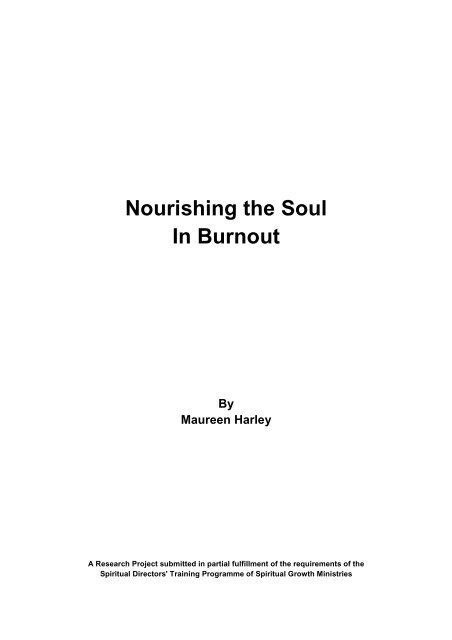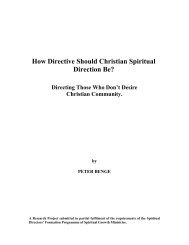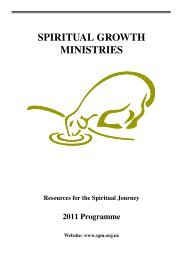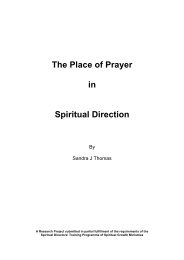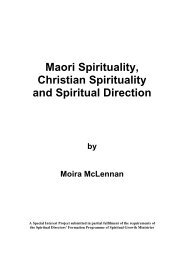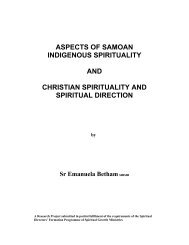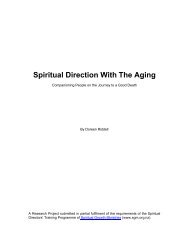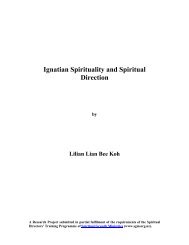Nourishing the soul in burnout - Spiritual Growth Ministries
Nourishing the soul in burnout - Spiritual Growth Ministries
Nourishing the soul in burnout - Spiritual Growth Ministries
Create successful ePaper yourself
Turn your PDF publications into a flip-book with our unique Google optimized e-Paper software.
<strong>Nourish<strong>in</strong>g</strong> <strong>the</strong> Soul<br />
In Burnout<br />
By<br />
Maureen Harley<br />
A Research Project submitted <strong>in</strong> partial fulfillment of <strong>the</strong> requirements of <strong>the</strong><br />
<strong>Spiritual</strong> Directors' Tra<strong>in</strong><strong>in</strong>g Programme of <strong>Spiritual</strong> <strong>Growth</strong> M<strong>in</strong>istries
Anne Dilenschneider refers to <strong>burnout</strong> <strong>in</strong> Christian workers as “Starvation of <strong>the</strong> Soul.” 1<br />
This phrase captured my imag<strong>in</strong>ation as I thought of some of <strong>the</strong> folk I work with. Some<br />
could <strong>in</strong>deed, us<strong>in</strong>g this analogy, be termed to be suffer<strong>in</strong>g from ‘malnourishment of <strong>the</strong><br />
spirit.’ This raised <strong>the</strong> question for me about whe<strong>the</strong>r spiritual direction might help to<br />
quicken <strong>the</strong>ir recovery from <strong>burnout</strong>.<br />
In my research I sought to answer <strong>the</strong> follow<strong>in</strong>g questions:<br />
1. What is <strong>burnout</strong> and how does it affect spiritual life?<br />
2. Which o<strong>the</strong>r conditions are similar to <strong>burnout</strong>?<br />
3. Has spiritual direction a role to play <strong>in</strong> <strong>burnout</strong> recovery?<br />
4. What characteristics of spiritual direction can I br<strong>in</strong>g to <strong>the</strong> <strong>soul</strong> <strong>in</strong> <strong>burnout</strong>?<br />
5. What particular practices/resources may be of value <strong>in</strong> direct<strong>in</strong>g a <strong>burnout</strong> sufferer?<br />
What is <strong>burnout</strong>?<br />
Burnout is <strong>the</strong> psychological term for an experience of long term exhaustion and dim<strong>in</strong>ished<br />
<strong>in</strong>terest 2 which results from an accumulation of stress factors which gradually exceeds <strong>the</strong><br />
<strong>in</strong>dividual’s cop<strong>in</strong>g mechanisms. 3 Burnout is expressed <strong>in</strong> signs of dis-stress 4 <strong>in</strong>clud<strong>in</strong>g:<br />
• “decreased energy, chronic sleep<strong>in</strong>g disorders, exhaustion<br />
• feel<strong>in</strong>g of failure and reduced sense of reward <strong>in</strong> vocation<br />
• loss of mental efficiency and engagement<br />
• sense of helplessness and <strong>in</strong>ability to see a way out of problems”<br />
• “cynicism and negativism about self, God, o<strong>the</strong>rs, work and <strong>the</strong> world generally 5<br />
• demoralisation – belief one is no longer effective<br />
• depersonalisation – treat<strong>in</strong>g oneself, God and o<strong>the</strong>rs <strong>in</strong> an impersonal way<br />
• detachment – withdraw<strong>in</strong>g from responsibilities<br />
• distanc<strong>in</strong>g – avoidance of social and <strong>in</strong>terpersonal contacts<br />
• defeatism – feel<strong>in</strong>g of be<strong>in</strong>g ‘beaten’, depressed mood state” 6<br />
How does <strong>burnout</strong> affect spiritual life?<br />
O’Donnell observes that long term discouragement can result <strong>in</strong> an “<strong>in</strong>ord<strong>in</strong>ate self focus that<br />
distorts one’s understand<strong>in</strong>g of God’s perspective and decreases one’s faith that God will<br />
move.” 7<br />
1 Dilenschneider, Anne, Soul Care and <strong>the</strong> Roots of Clergy Burnout, http://www.huff<strong>in</strong>gtonpost.com/anne-dilenschneider/<strong>soul</strong>care-and-<strong>the</strong>-roots-o_b_680925.html<br />
She writes, “...my doctoral research on transformational leadership and <strong>the</strong> spiritual life of pastors, as well as 12 years of<br />
consult<strong>in</strong>g <strong>in</strong> <strong>the</strong> field, show that <strong>the</strong> causes of clergy <strong>burnout</strong> and poor mental and physical health are far deeper than poor<br />
boundaries, or <strong>the</strong> failure to engage <strong>in</strong> self-care, or <strong>the</strong> seem<strong>in</strong>gly <strong>in</strong>satiable desires of congregations. Burnout and poor health<br />
are symptoms of a far deeper "dis-ease" of <strong>soul</strong> that has plagued clergy for nearly 100 years. They are symptoms of starvation.<br />
2 http://en.wikipedia.org/wiki/Burnout_%28psychology%29<br />
3 O”Donnell, Kelly, editor, Missionary Care, Count<strong>in</strong>g <strong>the</strong> Cost For World Evangelism, California (1992) 97<br />
4 International Federation of Red Cross and Red Crescent Society’s booklet, “Manag<strong>in</strong>g Stress <strong>in</strong> <strong>the</strong> field”, publ Geneva.<br />
http://www.ifrc.org/Docs/pubs/health/manag<strong>in</strong>g-stress-en.pdf, 9<br />
5 These are direct quotes from Maslach, Christ<strong>in</strong>a, quoted <strong>in</strong> article by Croucher, R, Stress and Burnout <strong>in</strong> M<strong>in</strong>istry,<br />
http://www.churchl<strong>in</strong>k.com.au/churchl<strong>in</strong>k/forum/r_croucher/stress_<strong>burnout</strong>.html<br />
6 These are direct quotes from Hart, Dr Arch quoted <strong>in</strong> <strong>the</strong> same article, Croucher,<br />
1<br />
©<strong>Spiritual</strong> <strong>Growth</strong> M<strong>in</strong>istries 2012
The negativism about self and o<strong>the</strong>rs and <strong>the</strong> decreased energy of <strong>burnout</strong> that lead to work<br />
and social disengagement impacts <strong>the</strong> person’s relationship with God. An impersonal way of<br />
th<strong>in</strong>k<strong>in</strong>g of oneself and o<strong>the</strong>rs dim<strong>in</strong>ishes ability to connect with a personal God; usual<br />
spiritual practices don’t br<strong>in</strong>g <strong>the</strong> usual sense of God’s presence. The person may be left with<br />
a sense of hav<strong>in</strong>g been abandoned by God. Physical tiredness and lack of concentration<br />
brought about by sleep difficulties fur<strong>the</strong>r dim<strong>in</strong>ishes <strong>the</strong> <strong>burnout</strong> sufferer’s energy to pursue<br />
spiritual activities. 8 There is often a spiritual crisis with accompany<strong>in</strong>g loss <strong>in</strong> and/or<br />
question<strong>in</strong>g of previously held core beliefs about God, self and <strong>the</strong> world 9 and <strong>the</strong> <strong>burnout</strong><br />
sufferer is easily led to “give up” on self and on God.<br />
I have observed that people <strong>in</strong> <strong>burnout</strong> often present as critical of <strong>the</strong> spiritual practices and<br />
enthusiasms of o<strong>the</strong>rs, and can be negative about <strong>the</strong>ir own church or Christian community.<br />
In spiritual direction sessions <strong>the</strong> person is more comfortable talk<strong>in</strong>g about work or family<br />
issues and f<strong>in</strong>ds it hard to even seek God <strong>in</strong> <strong>the</strong> experience or to see that <strong>the</strong> absence of God<br />
is significant. It is as if an absent God has become <strong>the</strong> norm and <strong>the</strong>re is no energy or po<strong>in</strong>t to<br />
hop<strong>in</strong>g to f<strong>in</strong>d <strong>the</strong> presence of God.<br />
Which o<strong>the</strong>r conditions of physical/emotional/spiritual stress are similar to <strong>burnout</strong>?<br />
One of my difficulties as I <strong>in</strong>vestigated <strong>the</strong> spiritual component of <strong>burnout</strong> was <strong>the</strong> similarity<br />
of symptoms with o<strong>the</strong>r conditions and <strong>the</strong> fact that often two or more conditions may appear<br />
concurrently. For example, stress may contribute to a reactive depression and a symptom of<br />
<strong>burnout</strong> is a flattened mood and <strong>in</strong>ability to engage with life which is a symptom of<br />
depression. The loss of a sense of God who is present <strong>in</strong> a dark night experience is also<br />
present <strong>in</strong> <strong>burnout</strong>. Accidie <strong>in</strong> its later stages carries an element of depressive illness and<br />
distance from God as does compassion fatigue. Each condition can appear with underly<strong>in</strong>g<br />
sleep disturbances and sense of fatigue with life and all have an underly<strong>in</strong>g sense of be<strong>in</strong>g<br />
abandoned by or distant from God.<br />
In spiritual direction <strong>the</strong> focus is not on diagnosis or treatment of <strong>the</strong> underly<strong>in</strong>g condition but<br />
on help<strong>in</strong>g <strong>the</strong> directee develop her/his relationship with God even while liv<strong>in</strong>g <strong>the</strong> condition.<br />
However, direction may <strong>in</strong>clude explor<strong>in</strong>g possible causes of <strong>the</strong> seem<strong>in</strong>g break <strong>in</strong><br />
relationship with God <strong>in</strong> order to help <strong>the</strong> directee to consider possible appropriate<br />
responses. 10 S<strong>in</strong> or lack of self care (<strong>in</strong>clud<strong>in</strong>g <strong>soul</strong> care), work<strong>in</strong>g conditions or personal life<br />
choices may all be present to some extent <strong>in</strong> all <strong>the</strong> follow<strong>in</strong>g conditions. Professional<br />
diagnosis and treatment may be one of <strong>the</strong> options and can be enhanced if undertaken<br />
concurrently with spiritual direction.<br />
7 O”Donnell, Kelly and Michele Lewis, article “Foxes Giants, and Wolves”, Published <strong>in</strong> International Journal of Frontier<br />
Missions, Vol 12:4 Oct-Dec(1995)<br />
8 Laidig, Joan & Speakman, Danielle “The Role of <strong>Spiritual</strong>ity <strong>in</strong> Understand<strong>in</strong>g and Cop<strong>in</strong>g with Traumatic Stress <strong>in</strong><br />
Humanitarian Aid Workers” Head<strong>in</strong>gton Institute (2010) 22<br />
9 ibid P37<br />
10 Picker<strong>in</strong>g, Sue. <strong>Spiritual</strong> Direction – a practical <strong>in</strong>troduction. Canterbury Press, Norwich (2008) 182<br />
2<br />
©<strong>Spiritual</strong> <strong>Growth</strong> M<strong>in</strong>istries 2012
I summarise like conditions briefly:<br />
Depression is an illness characterised by a persist<strong>in</strong>g sad, anxious or empty mood state that<br />
significantly <strong>in</strong>fluences <strong>the</strong> person’s every day life. Symptoms <strong>in</strong>clude, sleep<strong>in</strong>g<br />
disturbances, fatigue, loss of energy, feel<strong>in</strong>gs of guilt or worthlessness, thoughts of suicide or<br />
death 11 , and a sense of be<strong>in</strong>g abandoned by God 12<br />
Dark Night is a deep and ongo<strong>in</strong>g spiritual process that occurs when God removes much<br />
which had previously been relied on for spiritual life <strong>in</strong> order to br<strong>in</strong>g about a fuller<br />
dependence on God. 13 Symptoms may <strong>in</strong>clude some sense of hopelessness, helplessness and<br />
empt<strong>in</strong>ess along with changes <strong>in</strong> motivation, and self confidence 14 and lack of satisfaction <strong>in</strong><br />
former ways of prayer. 15<br />
Compassion Fatigue is experienced by care-givers <strong>in</strong> whom exposure to <strong>the</strong> suffer<strong>in</strong>g of<br />
clients coupled with an <strong>in</strong>ability to rescue <strong>the</strong>m, results <strong>in</strong> feel<strong>in</strong>gs of depletion, anxiety,<br />
depression, resentment, and/or emotional withdrawal with consequent sense of distance from<br />
God. 16<br />
Accidie 17 was thought of by <strong>the</strong> desert fa<strong>the</strong>rs as succumb<strong>in</strong>g to <strong>the</strong> temptation of “<strong>the</strong><br />
noonday demon” 18 It is characterised by dim<strong>in</strong>ish<strong>in</strong>g engagement <strong>in</strong> life as it is, <strong>in</strong> a search<br />
of a better way or place. 19 Accidie is characterised by sadness, apathy, dissatisfaction with<br />
colleagues and organisation or workplace, loss of energy, and a tendency to avoid<br />
commitment and seek change <strong>in</strong> search of <strong>the</strong> dreamed of experience (<strong>in</strong>clud<strong>in</strong>g spiritual<br />
experience). 20<br />
Has spiritual direction a role to play <strong>in</strong> <strong>burnout</strong>?<br />
Dilenschneider 21 and o<strong>the</strong>rs observe that lack of spiritual care is a root cause of <strong>burnout</strong>. 22 I<br />
myself have observed 23 a high level of disengagement with God and lack of participation <strong>in</strong><br />
11 Watson, Michael, “The Dark Night and Depression” ,<strong>Spiritual</strong> <strong>Growth</strong> M<strong>in</strong>istries Reseach Topic (2002)<br />
http://www.sgm.org.nz/Research%20Papers/Dark%20Night%20&%20Depression/Dark%20Night%20&%20Depression%20%2<br />
0Essay.pdf<br />
12 Woodman, Mary Ann, “Dark Nights” publ <strong>in</strong> PRESENCE, Vol 8, no.2 June( 2002)<br />
13 Watson, M, The Dark Night and Depression<br />
14 May. Gerald, Care of M<strong>in</strong>d/Care of Spirit: Psychiatric Dimensions of <strong>Spiritual</strong> Direction, Harper & Row (1982) P90,<br />
15 Woodman, Mary Ann, Dark Nights<br />
16 Venart, Elizabeth, “Creat<strong>in</strong>g Counsellor Wellness, Hazards of Practice.”<br />
http://www.counselorwellness.com/hazards_of_practice.html<br />
17 There are variants to <strong>the</strong> spell<strong>in</strong>g - acedia, accidie, accidia eg.<br />
18 Ps 91:6<br />
19 Norris, Kathleen, Acedia & Me: A Marriage, Monks, and A Writer’s Life, Riverhead Books, Pengu<strong>in</strong> Group, New York (2008)<br />
“The word literally means not-car<strong>in</strong>g, or be<strong>in</strong>g unable to care, and ultimately, be<strong>in</strong>g unable to care that one can't care”<br />
20 ibid and St John Cassian, The Monastic Institutes: The Tra<strong>in</strong><strong>in</strong>g of a Monk and <strong>the</strong> 8 Deadly S<strong>in</strong>s, Book X, The Spirit of<br />
Accidie” http://www.<strong>the</strong>nazareneway.com/Institutes%20of%20John%20Cassian/book_10_<strong>the</strong>%20_spirit_of_accidie.htm<br />
21 Dilenschneider, Anne, Soul Care and <strong>the</strong> Roots of Clergy Burnout;<br />
22 eg even a secular work by psychologists Joan Laidig PH. D. and Danielle Speakman PH.D. (teach<strong>in</strong>g on “The Role of<br />
<strong>Spiritual</strong>ity <strong>in</strong> Understand<strong>in</strong>g and Cop<strong>in</strong>g with Traumatic Stress <strong>in</strong> Humanitarian Aid Workers” Head<strong>in</strong>gton Institute (2010)<br />
acknowledges that for an aid worker to cease to allow her/his spiritual life to drop is a recipe for <strong>burnout</strong>. They quote Ana-<br />
3<br />
©<strong>Spiritual</strong> <strong>Growth</strong> M<strong>in</strong>istries 2012
spiritual discipl<strong>in</strong>es <strong>in</strong> people with <strong>burnout</strong> and note that one of <strong>the</strong> first th<strong>in</strong>gs to succumb to<br />
<strong>the</strong> ‘busy-ness’ of mission life is regular engagement with God <strong>in</strong> <strong>the</strong> discipl<strong>in</strong>es of prayer,<br />
stillness, study (<strong>in</strong> order to know God – many study to know about God).<br />
But <strong>burnout</strong> does not beg<strong>in</strong> only with a neglect of spiritual health. Dodds identifies <strong>the</strong><br />
qualities of self-giv<strong>in</strong>g sacrificial servanthood to which Christians are called as conta<strong>in</strong><strong>in</strong>g<br />
some of <strong>the</strong> very qualities that may lead to <strong>burnout</strong>. 24 The sheer scale of or type of m<strong>in</strong>istry<br />
may work with someone’s history and personality and predispose her/him to <strong>burnout</strong>.<br />
Burnout, <strong>the</strong>n, challenges a sufferer at <strong>the</strong> core of her/his be<strong>in</strong>g and beliefs about God and<br />
self and dra<strong>in</strong> her/his energy to deal with it. 25<br />
<strong>Spiritual</strong> direction seeks to enable a directee to:<br />
• “notice and attend to God’s personal communication <strong>in</strong> and through her/his lived<br />
experience;<br />
• respond to this personally communicat<strong>in</strong>g God;<br />
• grow <strong>in</strong> <strong>in</strong>timacy with this God;<br />
and<br />
• live out <strong>the</strong> consequences of <strong>the</strong> relationship.” 26<br />
This seek<strong>in</strong>g to notice God <strong>in</strong> <strong>the</strong> midst of <strong>the</strong> experience be<strong>in</strong>g lived seems to be a key to <strong>the</strong><br />
role spiritual direction can have <strong>in</strong> help<strong>in</strong>g a sufferer of <strong>burnout</strong> to rega<strong>in</strong> perspective and<br />
reformulate her/his views of her/himself and of God <strong>in</strong> <strong>the</strong> light of a breakdown of previous<br />
ways of be<strong>in</strong>g.<br />
I believe <strong>the</strong> exhaustion accompany<strong>in</strong>g <strong>burnout</strong> would make it hard for a sufferer to seek to<br />
beg<strong>in</strong> spiritual direction, though desperation to “do someth<strong>in</strong>g” may drive her/him to try. A<br />
care worker, I th<strong>in</strong>k, could offer direction as part of <strong>the</strong> care-package. A director <strong>in</strong> an<br />
ongo<strong>in</strong>g spiritual direction relationship with someone exhibit<strong>in</strong>g signs of <strong>burnout</strong> is uniquely<br />
placed to offer <strong>the</strong> ways of “<strong>soul</strong> care” as an adjunct to o<strong>the</strong>r treatments. 27<br />
Maria Rizzuto (1979) talk<strong>in</strong>g about how our conception of God no longer seems relevant <strong>in</strong> a transitional place – which life on<br />
<strong>the</strong> mission field surely is and how this contributes to a sense of deep and pa<strong>in</strong>ful spiritual lonel<strong>in</strong>ess. P45 .<br />
also see<br />
Mike Bickle (“What Are You First: A Worker Or A lover? http://www.secretplacem<strong>in</strong>istries.org/pages/articles/bickle/christian<strong>burnout</strong>.html<br />
) believes <strong>burnout</strong> is rooted <strong>in</strong> people’s launch<strong>in</strong>g <strong>in</strong>to m<strong>in</strong>istry before “<strong>the</strong>y establish <strong>in</strong> <strong>the</strong>mselves <strong>the</strong> foundation<br />
of be<strong>in</strong>g lovers of God,” He says <strong>burnout</strong> symptoms are <strong>in</strong>evitable if we do not fulfil our primary call<strong>in</strong>g to be lovers.<br />
Eenigenburg, S and Bliss, R., Expectations and Burnout – Women Surviv<strong>in</strong>g <strong>the</strong> Great Commission; William Carey Library,<br />
California (2010)<br />
23 as a member of a pastoral care team <strong>in</strong> a multicultural Christian Aid and Development Agency <strong>in</strong> South East Asia.<br />
24 Dodds, L.A. and Dodds, L.E., Stressed From Core to Cosmos: Issues and needs aris<strong>in</strong>g from cross-cultural m<strong>in</strong>istry. quoted<br />
<strong>in</strong> E<strong>in</strong>igenburg, S. and Bliss, R., Expectations and Burnout: Women Surviv<strong>in</strong>g <strong>the</strong> Great Commission.William Carey Library<br />
(2010) 179<br />
25 Laidig, Joan & Speakman, Danielle “The Role of <strong>Spiritual</strong>ity <strong>in</strong> Understand<strong>in</strong>g and Cop<strong>in</strong>g with Traumatic Stress <strong>in</strong><br />
Humanitarian Aid Workers, 37, quoted above.<br />
26 Barry, William A. and Connolly, William A., The Practice of <strong>Spiritual</strong> Direction , San Francisco: Harper Coll<strong>in</strong>s (1982)quoted<br />
<strong>in</strong> Picker<strong>in</strong>g, S., <strong>Spiritual</strong> Direction – A Practical Introduction; 27<br />
27 though I would not agree that a lack of attention to spiritual health is <strong>the</strong> sole cause of <strong>burnout</strong>. Surely perfect <strong>soul</strong> care<br />
could prevent <strong>burnout</strong> with <strong>the</strong> balance it would br<strong>in</strong>g to life. Unfortunately we live imperfect lives <strong>in</strong> an imperfect world and <strong>the</strong><br />
contribut<strong>in</strong>g factors to <strong>burnout</strong> are many and varied and not all able to be avoided.<br />
4<br />
©<strong>Spiritual</strong> <strong>Growth</strong> M<strong>in</strong>istries 2012
What characteristics of spiritual direction could help <strong>the</strong> <strong>soul</strong> <strong>in</strong> <strong>burnout</strong>? 28<br />
At <strong>the</strong> beg<strong>in</strong>n<strong>in</strong>g of my tra<strong>in</strong><strong>in</strong>g I def<strong>in</strong>ed for myself that:<br />
“<strong>Spiritual</strong> direction is a sacred covenant of friendship between two people who agree to meet<br />
toge<strong>the</strong>r under <strong>the</strong> direction of <strong>the</strong> Holy Spirit to attend to <strong>the</strong> way God’s love is be<strong>in</strong>g<br />
revealed <strong>in</strong> <strong>the</strong> lived experience of <strong>the</strong> person seek<strong>in</strong>g direction, and toge<strong>the</strong>r to explore ways<br />
<strong>the</strong> person might respond to God’s <strong>in</strong>vitation to growth and to <strong>in</strong>timacy.” 29<br />
To me, offer<strong>in</strong>g to walk with someone <strong>in</strong> <strong>burnout</strong> is perhaps <strong>the</strong> most lov<strong>in</strong>g and Christ-like<br />
offer<strong>in</strong>g that can be made. O<strong>the</strong>r relationships, medical, pastoral, counsell<strong>in</strong>g, all have <strong>the</strong>ir<br />
place <strong>in</strong> <strong>the</strong> treatment of <strong>burnout</strong> but each of <strong>the</strong>se, with <strong>the</strong>ir focus on mak<strong>in</strong>g th<strong>in</strong>gs better,<br />
has an implicit message to <strong>the</strong> client –“someth<strong>in</strong>g has to change/ be o<strong>the</strong>r. Only <strong>in</strong> spiritual<br />
direction is <strong>the</strong> “helper” agree<strong>in</strong>g to stay with <strong>the</strong> lived experience of <strong>the</strong> ‘client’, not to judge<br />
it as a wrong experience to be changed, but to help <strong>the</strong> ‘client’ to fathom <strong>the</strong> Mystery while<br />
liv<strong>in</strong>g through it.<br />
<strong>Spiritual</strong> direction offers a safe place to explore God <strong>in</strong> <strong>the</strong> light of <strong>the</strong> directee’s current and<br />
past lived experience. Direction offers encouragement to cont<strong>in</strong>ue when prayer dries up and<br />
God seems distant. Direction offers hope of a way through <strong>the</strong> tangled web of life. In <strong>the</strong><br />
self absorption of <strong>burnout</strong>, direction is a place where gently but firmly <strong>the</strong> focus is always<br />
brought back to where God might be <strong>in</strong> <strong>the</strong> midst of <strong>the</strong> experience, to faith and to prayer. 30<br />
Characteristics of direction <strong>in</strong> general <strong>in</strong>clude:<br />
‘Sitt<strong>in</strong>g patiently with’ - The spiritual director is a symbol of car<strong>in</strong>g that is at <strong>the</strong> heart of<br />
God’s faithfulness. (S)he is a visible presence that testifies to <strong>the</strong> unfail<strong>in</strong>g love and presence<br />
of God even <strong>in</strong> <strong>the</strong> lived sense of God’s absence.<br />
Po<strong>in</strong>t<strong>in</strong>g to God – The director rem<strong>in</strong>ds <strong>the</strong> directee that it is <strong>the</strong> <strong>in</strong>dwell<strong>in</strong>g Holy Spirit who<br />
is <strong>the</strong> source of <strong>the</strong> directee’s decision to come to direction and <strong>the</strong> active force <strong>in</strong> <strong>the</strong><br />
relationship. The person <strong>in</strong> <strong>burnout</strong> may not ‘feel’ that this is so for now, but <strong>in</strong> direction <strong>the</strong><br />
directee is aga<strong>in</strong> and aga<strong>in</strong> redirected to “a God who is not necessarily safe, but is Good” 31 .<br />
Reflect<strong>in</strong>g – The director seeks to reflect to <strong>the</strong> directee where God’s presence may be be<strong>in</strong>g<br />
revealed <strong>in</strong> her/his lived experience as well as reflect<strong>in</strong>g <strong>the</strong> directee’s own reactions to God’s<br />
revelation or seem<strong>in</strong>g lack of revelation and <strong>in</strong>vite a response. The director does not listen to<br />
28 I based my characteristics mostly on Barry W.A. and Connelly W.J., The Practice of <strong>Spiritual</strong> Direction, Seabury Press,<br />
M<strong>in</strong>esota(1982) Ch 8 & 9 especially<br />
29 This is born of read<strong>in</strong>g many def<strong>in</strong>itions and particularly from Barry, William A. and Connolly, William A., The Practice of<br />
<strong>Spiritual</strong> Direction; Bakke, Jeanette: Holy Invitations:Explor<strong>in</strong>g <strong>Spiritual</strong> Direction Baker Books Grand Rapids (2000); Benner,<br />
David G: Sacred Companions: The Gift of <strong>Spiritual</strong> Friendship and Direction Intervarsity Press Downers Grove ( 2002) ;<br />
Dougherty, Rose Mary SSND: Group <strong>Spiritual</strong> Direction: community for discernment, Paulist Press New Jersey (1995)<br />
30 Picker<strong>in</strong>g, S. <strong>Spiritual</strong> Direction – a practical <strong>in</strong>troduction. Ch1<br />
31 I read someth<strong>in</strong>g like this on a web page but cannot f<strong>in</strong>d <strong>the</strong> l<strong>in</strong>k back to it to acknowledge its reference.<br />
5<br />
©<strong>Spiritual</strong> <strong>Growth</strong> M<strong>in</strong>istries 2012
“fix” but to hear. The directee “owns” <strong>the</strong> process of receiv<strong>in</strong>g or not receiv<strong>in</strong>g <strong>the</strong> shared<br />
<strong>in</strong>sights.<br />
Discern<strong>in</strong>g <strong>the</strong> movements of <strong>the</strong> Holy Spirit and of <strong>the</strong> forces with<strong>in</strong> which resist <strong>the</strong> Spirit<br />
can help <strong>the</strong> directee to recognise <strong>the</strong> shades <strong>in</strong> all experiences; good as well as bad, right as<br />
well as wrong, and strengths as well as weaknesses and beg<strong>in</strong> to discern a way through or at<br />
least some options.<br />
Leech says that “direction <strong>in</strong>volves listen<strong>in</strong>g, exposure, nakedness of spirit before <strong>the</strong> storm<br />
and <strong>the</strong> fire.” 32 Seek<strong>in</strong>g toge<strong>the</strong>r, encouragement to keep look<strong>in</strong>g to God, sorrow<strong>in</strong>g and<br />
celebrat<strong>in</strong>g toge<strong>the</strong>r – <strong>the</strong>se are characteristics of spiritual direction which may be a lifel<strong>in</strong>e<br />
for <strong>the</strong> <strong>burnout</strong> sufferer.<br />
What particular practices or resources may be of value to a director who is direct<strong>in</strong>g a<br />
directee suffer<strong>in</strong>g from <strong>burnout</strong>?<br />
A person suffer<strong>in</strong>g from <strong>burnout</strong> is typically liv<strong>in</strong>g an all encompass<strong>in</strong>g exhaustion and sense<br />
of helplessness accompanied by a belief that no-one can help her/him. Burnout sufferers<br />
become <strong>in</strong>tensely self-focussed; f<strong>in</strong>d<strong>in</strong>g God or even believ<strong>in</strong>g <strong>in</strong> a God who wants to be<br />
found can seem impossible. 33 The sufferer can feel (s)he has noth<strong>in</strong>g to br<strong>in</strong>g to <strong>the</strong> work.<br />
For <strong>the</strong> person to even come for direction is a huge step of faith. Emotional detachment<br />
makes relationship with people and God difficult. Trust between directee and director<br />
develops only slowly.<br />
<strong>Spiritual</strong> direction practices of value <strong>in</strong> <strong>burnout</strong> <strong>in</strong>clude:<br />
Accompany<strong>in</strong>g - be<strong>in</strong>g will<strong>in</strong>g to be present with <strong>the</strong> directee on good days and bad, with<br />
what Barry and Connelly call “a surplus of warmth” 34 can help <strong>the</strong> person to hold <strong>the</strong><br />
experience <strong>in</strong> <strong>the</strong> light of God’s faithful promises. The demeanour and <strong>in</strong>terest of <strong>the</strong> director<br />
is a powerful tool for reflect<strong>in</strong>g <strong>the</strong> love of God towards <strong>the</strong> directee <strong>in</strong> a time of self doubt<br />
though obviously issues of transference and dependence need to be watched for. 35<br />
Listen<strong>in</strong>g with dual attention to <strong>the</strong> directee’s story and to discern <strong>the</strong> presence of God and<br />
reflect<strong>in</strong>g this to <strong>the</strong> directee. The listen<strong>in</strong>g also speaks of <strong>the</strong> director’s expectation that <strong>the</strong><br />
directee will f<strong>in</strong>d God – a hope <strong>the</strong> directee may not yet have while <strong>in</strong> <strong>burnout</strong>.<br />
Encourag<strong>in</strong>g faith. The <strong>burnout</strong> sufferer will need encouragement to see Love <strong>in</strong> her/his<br />
story at all, and may need rem<strong>in</strong>d<strong>in</strong>g that <strong>the</strong> work of transformation is not ours but a deeper<br />
work of <strong>the</strong> Holy Spirit that goes on even when we are exhausted and helpless.<br />
32 Leech, Kenneth, Soul Friend: <strong>Spiritual</strong> Direction <strong>in</strong> <strong>the</strong> Modern World; Pennsylvania: Morehouse(2001) 28<br />
33 O”Donnell, Kelly and Michele Lewis, article “Foxes Giants, and Wolves”, Published <strong>in</strong> International Journal of Frontier<br />
Missions, Vol 12:4 Oct-Dec(1995)<br />
34 Barry, W.A. and Connelly, W.J. The Practice of <strong>Spiritual</strong> Direction 126<br />
35 In <strong>the</strong> perceived absence of God <strong>the</strong>re could be a tendency for <strong>the</strong> Directee to transfer some of her/his trust and hope to <strong>the</strong><br />
Director or to place blame for <strong>the</strong> lack of spiritual satisfaction on <strong>the</strong> Director’s direction.<br />
6<br />
©<strong>Spiritual</strong> <strong>Growth</strong> M<strong>in</strong>istries 2012
Challeng<strong>in</strong>g to see distortions <strong>in</strong> th<strong>in</strong>k<strong>in</strong>g of God or self or situation; which <strong>in</strong>cludes overspiritualis<strong>in</strong>g<br />
of <strong>the</strong> situation, 36 deny<strong>in</strong>g God’s desire or ability to help and distorted images<br />
of self, of God or <strong>the</strong> helplessness of <strong>the</strong> situation. Challeng<strong>in</strong>g is done gently to plant a seed;<br />
<strong>the</strong> Spirit is <strong>the</strong> One to confront and convict <strong>in</strong> <strong>the</strong> right time. The directee cont<strong>in</strong>ues to own<br />
<strong>the</strong> process and choose what and how to respond.<br />
Ask<strong>in</strong>g questions can uncover hidden factors, woundedness, griefs, angers and false patterns<br />
of th<strong>in</strong>k<strong>in</strong>g. Perceptive questions can lead to greater know<strong>in</strong>g of self and of God and enable<br />
<strong>the</strong> directee f<strong>in</strong>d hope <strong>in</strong> <strong>the</strong> truth of God’s sovereignty and grace.<br />
Reflect<strong>in</strong>g back to <strong>the</strong> directee what (s)he is say<strong>in</strong>g or not say<strong>in</strong>g, reflect<strong>in</strong>g where God may<br />
be work<strong>in</strong>g, reflect<strong>in</strong>g anomalies and unspoken questions or beliefs. In <strong>burnout</strong> emotional<br />
detachment is prevalent and a sense of one’s own lovability is lost. In <strong>the</strong> beg<strong>in</strong>n<strong>in</strong>g, <strong>the</strong><br />
director’s reflect<strong>in</strong>g back what (s)he is hear<strong>in</strong>g is a powerful way of communicat<strong>in</strong>g to <strong>the</strong><br />
directee that she/he is not only be<strong>in</strong>g heard but is also found to be worth listen<strong>in</strong>g to. As <strong>the</strong><br />
relationship develops <strong>the</strong> directee may grow <strong>in</strong> ability to hear <strong>the</strong> director reflect<strong>in</strong>g heard<br />
patterns of truths and lies and <strong>in</strong> identify<strong>in</strong>g with <strong>the</strong> movements of God’s grace discerned.<br />
Advis<strong>in</strong>g may be required. In <strong>burnout</strong> <strong>the</strong> directee may feel an all encompass<strong>in</strong>g helplessness<br />
to do anyth<strong>in</strong>g her/himself about her/his condition. The director may need to suggest seek<strong>in</strong>g<br />
medical or counsell<strong>in</strong>g help, or advise on basic self-care issues. 37<br />
Teach<strong>in</strong>g new ways of be<strong>in</strong>g with God that take <strong>in</strong>to account <strong>the</strong> directee’s physical,<br />
emotional, spiritual exhaustion. The loss of focus <strong>in</strong> <strong>burnout</strong> can be profound and <strong>the</strong> director<br />
can help identify some simple rout<strong>in</strong>es of prayer, bible read<strong>in</strong>g and reflection to anchor <strong>the</strong><br />
directee’s <strong>in</strong>tention towards God even while passion is absent. This may <strong>in</strong>clude explor<strong>in</strong>g<br />
some of <strong>the</strong> follow<strong>in</strong>g:<br />
• Repetitive prayers to still <strong>the</strong> m<strong>in</strong>d and free <strong>the</strong> spirit, eg. us<strong>in</strong>g a phrase from<br />
scripture or <strong>the</strong> Jesus Prayer.<br />
• The prayer of stillness and patient endur<strong>in</strong>g may be aided by us<strong>in</strong>g an external focus<br />
eg. an icon or pa<strong>in</strong>t<strong>in</strong>g<br />
• Internet/podcasts provide <strong>the</strong> opportunity to listen to daily prayer, lectionary read<strong>in</strong>gs<br />
etc. as listen<strong>in</strong>g can be a particularly beneficial way of attend<strong>in</strong>g to spiritual<br />
discipl<strong>in</strong>es when <strong>the</strong> energy for read<strong>in</strong>g or speak<strong>in</strong>g is low. 38<br />
• Commitment to regular use of liturgy.<br />
36 though <strong>the</strong> enemy undoubtedly fosters separation from God <strong>in</strong> <strong>the</strong> <strong>burnout</strong> sufferer, it is not helpful to see it all as a demonic<br />
attack. Commonsense dictates that proper attention to rest, diet, sleep, work practices and exercise is called for along with<br />
helpful spiritual practices. Equally it is wrong to assume that Satan will not use this time to foster wrong th<strong>in</strong>k<strong>in</strong>g and beliefs.<br />
37 eg. Proper attention to diet, sensible work hours, adequate rest, exercise. The <strong>burnout</strong> victim can feel a “victim of<br />
circumstances’ and may need to be called to practical commonsense self-care.<br />
38 Sourced from “helpful suggestion from Andrew Pritchard, Convenor, <strong>Spiritual</strong> <strong>Growth</strong> M<strong>in</strong>istries, NZ<br />
7<br />
©<strong>Spiritual</strong> <strong>Growth</strong> M<strong>in</strong>istries 2012
• Examen to actively seek to notice <strong>the</strong> movements of God; for <strong>the</strong> <strong>burnout</strong> sufferer,<br />
becom<strong>in</strong>g aware of one small grace can speak of a God who is still present.<br />
• Meditation on scripture.<br />
• Be<strong>in</strong>g out <strong>in</strong> nature.<br />
• Walk<strong>in</strong>g, listen<strong>in</strong>g to music, pa<strong>in</strong>t<strong>in</strong>g, draw<strong>in</strong>g, modell<strong>in</strong>g, or creat<strong>in</strong>g may be helpful<br />
both as an activity <strong>in</strong> which feel<strong>in</strong>gs may be safely expressed and as a reflective tool.<br />
• Journall<strong>in</strong>g.<br />
• Handouts and books are helpful to some but may be better left until some energy has<br />
returned.<br />
• Dreams or night-time fears <strong>in</strong> <strong>the</strong> wakefulness may be explored; though care must be<br />
taken to focus on God and not slip <strong>in</strong>to counsell<strong>in</strong>g.<br />
The most valuable practice spiritual direction offers is her/his faithful prayer for <strong>the</strong> directee<br />
and <strong>the</strong> greatest resource is <strong>the</strong> ongo<strong>in</strong>g and lov<strong>in</strong>g <strong>in</strong>ternal work of <strong>the</strong> Holy Spirit.<br />
Conclusion:<br />
Burnout is a condition of long term exhaustion with a decreased ability to cope with every<br />
day life <strong>in</strong> a way that is conducive to physical, emotional and spiritual health. It is a rooted <strong>in</strong><br />
many and varied causes and affects people <strong>in</strong> many situations of life. It produces symptoms<br />
similar to o<strong>the</strong>r conditions of physical, emotional and spiritual stress. These conditions may<br />
be <strong>in</strong>ter-related.<br />
Sufferers of <strong>burnout</strong> experience a doubt<strong>in</strong>g of previously held beliefs about what works for<br />
<strong>the</strong>m. They may well be question<strong>in</strong>g who <strong>the</strong>y are, what value <strong>the</strong>y have as a person and how<br />
that is best expressed. They may also be ask<strong>in</strong>g where is <strong>the</strong> God <strong>the</strong>y have believed <strong>in</strong> or<br />
what this experience has to say about God. Burnout sufferers may lack <strong>the</strong> energy and<br />
motivation to manage <strong>the</strong>ir own spiritual well-be<strong>in</strong>g on <strong>the</strong>ir own.<br />
A spiritual director can come alongside <strong>the</strong> sufferer where (s)he is, offer<strong>in</strong>g a warm<br />
relationship and acceptance of <strong>the</strong> person’s lived experience without fault-f<strong>in</strong>d<strong>in</strong>g. Direction<br />
constantly calls for <strong>the</strong> focus to be on God, and to look to <strong>the</strong> Holy Spirit as Director and <strong>the</strong><br />
One who is directly <strong>in</strong>volved <strong>in</strong> <strong>the</strong> person’s “now”. The Director’s will<strong>in</strong>gness to encourage<br />
and to challenge and her/his cont<strong>in</strong>ued example of faith <strong>in</strong> <strong>the</strong> promises of God can be a<br />
constant as <strong>the</strong> sufferer works out new ‘truths’ <strong>in</strong> <strong>the</strong> light of her/his experience.<br />
The practice of spiritual direction as taught by <strong>Spiritual</strong> <strong>Growth</strong> M<strong>in</strong>istries 39 could be a<br />
valuable tool <strong>in</strong> <strong>the</strong> prevention of <strong>burnout</strong> or <strong>in</strong> pick<strong>in</strong>g up <strong>the</strong> early warn<strong>in</strong>g signs that<br />
someone is head<strong>in</strong>g for <strong>burnout</strong>. It could also be offered to <strong>burnout</strong> sufferers, though an<br />
excess of patience may be needed dur<strong>in</strong>g <strong>the</strong> long recovery period as <strong>the</strong> sufferer struggles<br />
with lack of energy and motivation. Direction seeks to help <strong>the</strong> directee to f<strong>in</strong>d God <strong>in</strong> <strong>the</strong><br />
39 and rooted <strong>in</strong> <strong>the</strong> teach<strong>in</strong>g of spiritual directors such as Connelly, Barry, Leech and Bakke – see<br />
bibliography below.<br />
8<br />
©<strong>Spiritual</strong> <strong>Growth</strong> M<strong>in</strong>istries 2012
experience, to consider what response might be possible, and how it might be possible to<br />
grow <strong>in</strong> <strong>in</strong>timacy with this self-reveal<strong>in</strong>g God <strong>in</strong> <strong>the</strong> light of lived experience. Direction can<br />
offer new ways of prayer and of be<strong>in</strong>g ‘with’ God which may be tested.<br />
The aim would always be to enable <strong>the</strong> sufferer to so live <strong>the</strong> experience of <strong>burnout</strong> that by<br />
<strong>the</strong> grace of God <strong>the</strong> time of <strong>burnout</strong> becomes a time of grow<strong>in</strong>g <strong>in</strong> relationship with God.<br />
Bibliography of books and works consulted.<br />
Books<br />
Bakke, Jeanette. Holy Invitations, Baker Books: Grand Rapids(2000)<br />
Barry, William and Connolly, William.The Practice of <strong>Spiritual</strong> Direction, HarperColl<strong>in</strong>s:<br />
New York(1982)<br />
Chew,Jim.When You Cross Cultures, The Navigators: S<strong>in</strong>gapore(1990)<br />
Coll<strong>in</strong>s, Gary. Christian Counsell<strong>in</strong>g, A Comprehensive Guide, W Publish<strong>in</strong>g Group:<br />
USA(1988)<br />
Eenigenburg, S and Bliss, R. Expectations and Burnout; Women Surviv<strong>in</strong>g <strong>the</strong> Great<br />
Commission, William Carey Library: USA(2010)<br />
Foster, R and Yanni, K,. Celebrat<strong>in</strong>g <strong>the</strong> Discipl<strong>in</strong>es; <strong>the</strong> essential companion to Celebration<br />
of Discipl<strong>in</strong>e, Hodder and Stoughton: London(1992)<br />
Foyle, Marjorie. Honourably Wounded; Stress Among Christian Workers,Kent, Bookpr<strong>in</strong>t<br />
Creative Services: England(1987)<br />
Guen<strong>the</strong>r, Margaret. Holy Listen<strong>in</strong>g, The Art of <strong>Spiritual</strong> Direction, Darton, Longman and<br />
Todd Ltd: London(1993)<br />
Leech, Kenneth. Soul Friend:<strong>Spiritual</strong> Direction <strong>in</strong> <strong>the</strong> Modern World, Morehouse:<br />
Pennsylvania(2001)<br />
May, Gerald G. Care of M<strong>in</strong>d Care of Spirit , Harper & Row: San Francisco(1982)<br />
Norris, Kathleen. Acedia & Me; A Marriage, Monks and A Writer’s Life, Riverhead Books:<br />
New York(2008)<br />
O’ Donnell, Kelly(ed.) Missionary Care; Count<strong>in</strong>g <strong>the</strong> Cost for World Evangelism, William<br />
Carey Library: Passedena(1992)<br />
9<br />
©<strong>Spiritual</strong> <strong>Growth</strong> M<strong>in</strong>istries 2012
O’Donnell, Kelly(ed.) Do<strong>in</strong>g Membercare Well; Perspectives and Practices From Around<br />
<strong>the</strong> World, William Carey Library: Passedena(2002 )<br />
Picker<strong>in</strong>g, Sue. <strong>Spiritual</strong> Direction; A Practical Introduction,: Canterbury Press:<br />
Norwich(2008)<br />
Schubert, E. What Misssionaries Need to Know About Burnout and Depression, Olive Branch<br />
Publications: Newcastle(1993)<br />
Articles<br />
<strong>Spiritual</strong> <strong>Growth</strong> M<strong>in</strong>istries Home Page – research papers submitted <strong>in</strong> <strong>Spiritual</strong> Direction<br />
Formation Programme: www.sgm.org.nz/research_papers.htm<br />
Gore, Joan, Missionaries <strong>in</strong> Isolated Places and <strong>Spiritual</strong> Direction<br />
Palmer,Alison, Issues Fac<strong>in</strong>g Return<strong>in</strong>g Missionaries and How <strong>Spiritual</strong> Direction Can Help<br />
Tooley,Margaret, <strong>Spiritual</strong> Direction by Email for Missionaries <strong>in</strong> Isolated Places: An Initial<br />
Exploration<br />
Watson, Michael , Dark Night and Depression<br />
O’Donnell Patricia, The Creative Process As A Tool <strong>in</strong> <strong>Spiritual</strong> Direction<br />
<strong>Spiritual</strong> <strong>Growth</strong> M<strong>in</strong>istries Study Notes, Clos<strong>in</strong>g Weekend<br />
International Federation of Red Cross and Red Crescent Societies, Manag<strong>in</strong>g Stress <strong>in</strong> <strong>the</strong><br />
Field. Geneva: 2009 (4 th edition)<br />
Fitzgerald, Constance OCD, Impasse and Dark Night, from LIVING WITH APOCOLYPSE,<br />
Harper and Row (out of pr<strong>in</strong>t)<br />
Laidig, J, and Speakman, D, The Role of <strong>Spiritual</strong>ity <strong>in</strong> Understand<strong>in</strong>g and Cop<strong>in</strong>g with<br />
Traumatic Stress <strong>in</strong> Humanitarian Aid Workers, from Cont<strong>in</strong>u<strong>in</strong>g Education Series,<br />
Head<strong>in</strong>gton Institute: 2009<br />
O’Donnell, K and M.L, Foxes, Giants, And Wolves, International Journal of Frontier<br />
Missions, Vol 12:4, Oct.-Dec. 1995<br />
Ruff<strong>in</strong>g, Janet, Resist<strong>in</strong>g <strong>the</strong> Demon of Busyness, <strong>in</strong> PNEUMA, Vol 3 No1 Spr<strong>in</strong>g 1996<br />
Wheatley, M, The Place Beyond Fear and Hope (PDF), Shambhala Sun, March 2009<br />
Woodman, Mary Ann, Dark Nights, <strong>in</strong> PRESENCE, (Journal of <strong>Spiritual</strong> Directors<br />
International) Volume 8 No 2 June 2002<br />
10<br />
©<strong>Spiritual</strong> <strong>Growth</strong> M<strong>in</strong>istries 2012
Websites<br />
http://ia700109.us.archive.org/22/items/Help<strong>in</strong>gMissionariesGrowRead<strong>in</strong>gsInMentalHealth<br />
AndMissions1988/12-Help<strong>in</strong>gMissionariesGrow86<br />
www.churchl<strong>in</strong>k.com.au/churchl<strong>in</strong>k<br />
http://www.secretplacem<strong>in</strong>istries.org/pages/articles/bickle/christian-<strong>burnout</strong>.html<br />
http://m<strong>in</strong>dyourmaker.wordpress.com/2008/10/03/aldous-huxley-on-accidie-aka-melancholyboredom-ennui-despair/<br />
http://www.m<strong>in</strong>dtools.com/stress/Brn/BurnoutSelfTest.htm<br />
http://www.<strong>the</strong>nazareneway.com/Institutes%20of%20John%20Cassian/book_10_<strong>the</strong>%20_<br />
spirit_of_accidie.htm<br />
http://www.pastor<strong>burnout</strong>.com/overcom<strong>in</strong>g-<strong>burnout</strong>.html<br />
http://www.netdoctor/uk/diseases/facts/depression<br />
http://helpguide.org/mental/<strong>burnout</strong>_signs_symptoms.htm<br />
http://www.counselorwellness.com/hazards_of_practice.html<br />
Maureen Harley<br />
mauger@ihug.co.nz<br />
11<br />
©<strong>Spiritual</strong> <strong>Growth</strong> M<strong>in</strong>istries 2012


